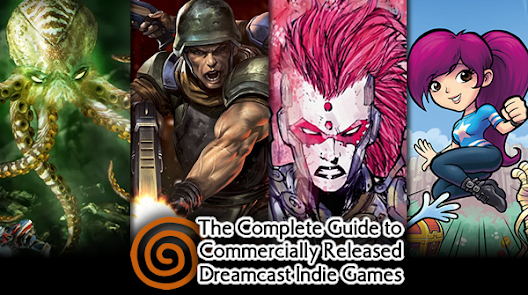
The fact that we're still blathering on about the Dreamcast some 20 odd years after the console's demise is testament to two things - the fact that we're sad little people still holding on to a mere glimmer of nostalgia about our youth as we rapidly approach middle age, and also the fact that the community will just not let this console die. We obviously don't talk about the first of those points much (we don't want to remind ourselves that we're becoming less and less culturally literate with every rotation of this damn rock around the sun), but we do talk about how "alive" the system is all the time. Probably too much, to be honest, as many people like to put the Dreamcast firmly in the "past" folder in their brain, preferring to remember what it was like when it was new and current. This is completely understandable, to view the console solely through a sense of nostalgia especially now that we have so many ways of experiencing the console's library which don't rely on having shelves full of games (or spindles full of CD-Rs). We're in that stage of the console's post-life cycle that has many people who left their video gaming behind when they were young dipping into the console once more, stirring up their memories of happier times, and no doubt probably quite confused as to why some of us never left the machine in the past and have continued to be fascinated by Sega's last great home endeavour to this very day.
Whilst the nostalgia is to be expected, it is the vitality of the current Dreamcast scene which keeps us writing about it. In between the tired posts of social media influencers asking people if they remember Sonic Adventure or Crazy Taxi, there has been an incredibly active scene covering every element of the Dreamcast for years. We have new hardware and controllers, games with online modes re-activated, more translations of Japanese games than I can actually keep track of, books, magazines, an entire series of arcade titles ported to the console, and a strong homebrew community that is creating some astonishing things. And it's that last point that allows me to pivot, finally, towards the point of this article. Alongside homebrew ports of classic titles (as I write this, the recent demo of the Metal Gear Solid 2 port is literally mind blowing) and fun little projects, we've now had 20 years of "proper" retail-released indie titles for the Dreamcast. My aim here is to document all of these in one article. I do love a long article...
I love Dreamcast indie titles. While they are not officially licensed by Sega, there is something very special about receiving a physical version of a game to be played on a console a quarter of a century old. The quality of the Dreamcast indie scene varies, which is to be expected, but even when a game is a bit crappy, I still have a certain sense of respect that it has been released on the console at all. Of course, I am a big weirdo, and will pick up anything you slap a "Dreamcast" label on, but for those who want to be a bit more selective with their hard-earned cash when expanding their Dreamcast library, a subjective view is always useful. In this article I hope to do just that - as well as take a look back at the various versions of the games that were released, where you can pick them up today, and any other interesting things that I can cram in before losing all excitement about writing this already massive article. This will also be constantly updated (hello, future people!) with my views on any new indie release, which will hopefully allow it to be a one-stop-shop for anyone interested in the broad DC indie scene - this will of course sit alongside our regular indie reviews from the entire DCJY team (I can also recommend Laurence's superb roundup of the indie scene in this article, if you want a slightly different perspective). It's also worth checking out our directory of indie developers and publishers, where you'll find direct links to all those involved in the indie scene.
Now, I need to add some context and "rules" here. The scope of this article will not include every single homebrew port or project - the first rule of the article is that it had to have been released physically and could be purchased by anyone. Of course, you can pick up a copy of any of the homebrew ports with nice printed inlays on Etsy - so that's when the second rule comes in: the physical release must have been officially sanctioned by the developer or rights holder. Finally, only full releases will count - so no demos, hacks or mods will be included, although total conversion mods that became standalone games in their own right do count. For the context of this article, only the games that meet the criteria I've just established will be called "indie releases". Will I probably end up breaking these rules to include something that I probably shouldn't? You betcha. Welcome to the wonderful world of "Mike doesn't stick to his own rules".
Enough of my nonsense (well, enough of this opening bit of nonsense, there's a lot more nonsense that lies ahead, I'm afraid!) - on with the article!


























